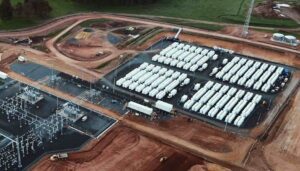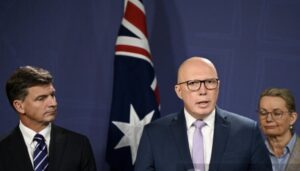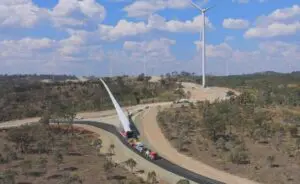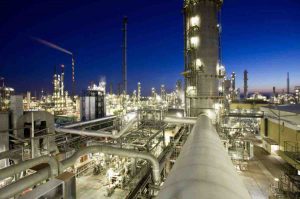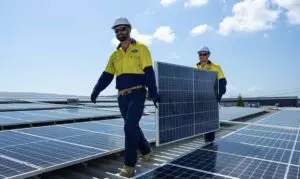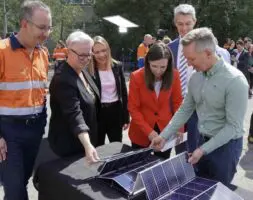Rod Sims, Australia’s former and sometimes controversial competition czar, has joined forces with professor Ross Garnaut to make the case for Australia’s opportunity as a global green energy superpower, and to fight the information war agains legacy industries not keen on change.
Sims has emerged as chairman of the Superpower Institute, a new think tank funded by philanthropists that seeks to promote the massive opportunities of a green energy future, and fight the misinformation campaign that has turned the country into a back marker over the past decade.
“We can’t afford to let others take the opportunity,” Sims says in an interview in the latest episode of RenewEconomy’s weekly Energy Insiders podcast.
“But step one is we’ve got to realise the opportunities here. We’ve got to change the narrative so people understand that …. we’ve got a massive advantage in terms of our solar and wind resources and our landmass, to actually be the leader.
“Getting this right is going to see Australia with some of, if not the lowest cost power in the world. I’ve just got no doubt about that.”
During his time as the head of the Australian Competition and Consumer Commission Sims may not have not come across as the greenest of energy advocates, even if he might have quietly appreciated the way that renewables were challenging the oligopoly and pricing power of the legacy fossil industry.
He says his moment of clarity emerged after reading the introduction to one of Garnaut’s SuperPower books that he was asked to launch, and now he intends to play a prominent role in pushing for a rapid green energy transition – not just in the grid but across the economy.
Sims says the opportunities go beyond simply producing a lot of green energy for the country’s grid – he sees opportunities in exporting green metals and other products, taking advantage of its riches in wind and solar, key transition minerals, processing of iron ore and bauxite, its skills base and a massive potential in biomass.
The biggest problem, he says, is one about public information, and that’s a battle that the Superpower Institute intends to fight.
“I think it’s got a lot to do with information,” Sims says.
“I think the companies who haven’t to be perhaps a bit protective of them thought enough about the transition, or who just judge that it’s in their commercial interests to keep doing things as business as usual, rather than making the transition, which I think commercially is a wrong call.
“But but that’s the call some of the making. They can put information out there that I think needs to be tested, and to some extent corrected, and a bit of practical research can do this.
“I think we really need to get facts and data in front of people. We need to change public opinion, change the economic narrative, that’s just a crucial step.
“And we make sure that the narrative is not dominated by those who have a different commercial interest. And that’s what the Superpower Institute, working with others, is going to be trying to do.”
The organisation has been launched in South Australia, and the state government has mandated the Superpower Institute to do its first full study, presumably on the immense green hydrogen and energy transition opportunities in the state that leads the world on the uptake of wind and solar.
Those “variable renewables” now account for 70 per cent of the state’s electricity demand, and 80 per cent over the last summer, and renewables are finally starting to unlock the pricing power grip retained by the state’s fossil fuel generators, now entirely gas rather than coal.
As a keen observer of energy market competitive forces, Sims is aware of those issues.
“In South Australia, yes, you’ve got quite a number of problems,” he says. “One is the load is very uneven. Now, what we’re talking about in South Australia would even up that load enormously.
“They’d be much more used for industry relative to House Health. You’d be making much better use of existing infrastructure and of course, the volume going over infrastructure determines the price.
“And because you need a lot of new generation I think there are things governments can do to make sure that new generation provides competition rather than just support the existing players. So I think there’s an enormous opportunity in South Australia to transform that landscape.”
You can listen to the full interview with Rod Sims on the latest episode of Energy Insiders here.


